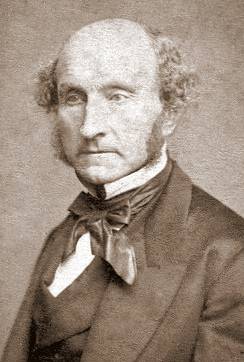
FAQ About John Stuart Mill

Who was John Stuart Mill?
John Stuart Mill was a British philosopher and political economist, born on May 20, 1806, and passed away on May 8, 1873. He is best known for his influential works on liberty, utilitarianism, and social and political theory, which have profoundly shaped modern thought on individual freedom and ethical practices. Some of his most notable works include 'On Liberty' and 'Utilitarianism.'

What is John Stuart Mill's concept of liberty?
John Stuart Mill's concept of liberty is best articulated in his seminal work, 'On Liberty,' where he argues for the protection of individual freedoms against societal norms and government intervention, as long as one's actions do not harm others. He famously formulated the 'harm principle,' suggesting that individuals should be free to act however they wish unless their actions cause harm to others.

What are the key ideas of Mill's utilitarianism?
Mill's utilitarianism is a moral theory that suggests actions are right if they promote the greatest happiness for the greatest number of people. In his essay 'Utilitarianism,' Mill expands on Jeremy Bentham's original concept of utilitarianism by emphasizing the quality of pleasures instead of just the quantity. Mill argues that intellectual and moral pleasures (higher pleasures) are superior to mere physical satisfaction (lower pleasures).

How did John Stuart Mill contribute to feminist thought?
John Stuart Mill made significant contributions to feminist thought, most notably through his essay 'The Subjection of Women' (1869). In this work, he argues for the equality of women and men's legal and social status, advocating for women's rights to education and participation in politics. Mill asserts that society's progress is markedly hindered by suppressing women's potential, making a case for gender equality decades before it became a widespread movement.

What is the 'harm principle' proposed by John Stuart Mill?
The 'harm principle' is a key concept in John Stuart Mill's philosophy outlined in his work 'On Liberty.' According to this principle, the actions of individuals should only be limited to prevent harm to other individuals. In other words, individuals have the freedom to behave as they wish unless it causes harm to others, thereby setting boundaries for societal intervention.

What did John Stuart Mill believe about freedom of speech?
John Stuart Mill was a staunch advocate for freedom of speech, which he saw as a fundamental component of individual liberty and a necessary condition for a healthy society. In his work 'On Liberty,' Mill argues that all ideas, even unpopular or offensive ones, should be freely discussed and debated because through debate, truth can emerge. He believed that the suppression of speech would lead to a loss of individual potential and social progress.

How did John Stuart Mill's upbringing influence his work?
John Stuart Mill's upbringing had a profound influence on his work. He was educated by his father, James Mill, a strict proponent of Bentham's utilitarianism, who sought to turn him into a genius intellect and advocate for reform. From a young age, Mill was exposed to a rigorous education in classical literature, history, and philosophy, shaping his intellectual development and his future contributions to philosophy, economics, and social theory.

What is John Stuart Mill's relevance to modern political thought?
John Stuart Mill's relevance to modern political thought is vast, as his ideas form the cornerstone for many contemporary discussions on individual rights and liberties. His concepts surrounding freedom, especially concerning speech, women's rights, and democratic governance, continue to influence debates in political philosophy and public policy. His advocacy for utilitarian ethics also plays a significant role in modern moral and political decision-making processes.

Did John Stuart Mill hold any political positions?
Yes, John Stuart Mill held political office. He served as the Member of Parliament (MP) for Westminster from 1865 to 1868. During his tenure, he advocated for issues such as women's suffrage, proportional representation, and the abolition of the death penalty, leveraging his political role to further his philosophic ideals of individual liberty and social reform.

How did John Stuart Mill's philosophy influence economics?
John Stuart Mill's contributions to economics are seen through his work 'Principles of Political Economy' (1848), which became a standard textbook for decades. In this work, Mill brings together classical economic theories with considerations of social welfare, discussing topics like the role of government, labor rights, and social justice—all of which have influenced modern economic theories and debates around policy interventions and economic ethics.

What distinguishes Mill's utilitarianism from that of Jeremy Bentham?
While both John Stuart Mill and Jeremy Bentham are foundational figures in utilitarian philosophy, Mill distinguishes his version by emphasizing the quality of pleasures over the quantity. Bentham's approach was more quantitative, suggesting all pleasures were equal and should be measured in the amount of happiness they produce. Mill, however, introduced the concept of higher (intellectual and moral) and lower (physical) pleasures, arguing that certain kinds of happiness are more valuable and should be prioritized.

What did John Stuart Mill write about democracy?
John Stuart Mill wrote extensively about democracy, prominently in his book 'Considerations on Representative Government.' Mill believed in representative democracy as the best form of government to protect individual liberty. However, he also warned of the 'tyranny of the majority,' where the majority in a democratic setup could impose its will on minorities, and advocated for systems, like plural voting and education, to mitigate this issue.

How did personal experiences impact Mill's work on liberty?
Personal experiences greatly impacted Mill's work, especially his crisis of faith in his twenties, which was partly addressed through engagement with the works of the Romantic poets and philosophers. This personal tribulation led him to appreciate the importance of individual emotional and intellectual development, influencing his later work 'On Liberty,' where he articulates the necessity of personal freedom for human flourishing.

What is the significance of Mill's essay 'On Liberty'?
Mill's 1859 essay 'On Liberty' is one of his most significant works, contributing deeply to liberal political philosophy. It discusses the nature and limits of the power that can be legitimately exercised by society over the individual, introducing key concepts such as the 'harm principle.' This text has been foundational in shaping modern discussions of personal freedom and the role of the state in intervening in personal affairs.

Did John Stuart Mill have any notable collaborators or influences?
John Stuart Mill was notably influenced by his father, James Mill, and mentor Jeremy Bentham, who were both key figures in utilitarian philosophy. His collaboration with Harriet Taylor Mill, whom he eventually married, significantly influenced his thoughts on women's rights and equality. The intellectual exchange with Taylor contributed to his work on social justice and equality.

How does Mill's conception of higher and lower pleasures affect his utilitarianism?
Mill's concept of higher and lower pleasures introduces a qualitative dimension to utilitarianism. Higher pleasures refer to intellectual and moral pursuits which he considered superior to lower, more base physical pleasures. This distinction affects moral decision-making by suggesting that actions should aim at promoting higher pleasures for individuals, thus enriching life beyond mere physical gratification and influencing complex ethical evaluations.

What criticism has Mill's utilitarianism faced?
Mill's utilitarianism, like Bentham's, has faced criticism largely for oversimplifying moral judgments by focusing primarily on the consequences of actions rather than intentions or intrinsic moral principles. Critics argue that the calculus of happiness may overlook justice and individual rights. Furthermore, Mill's focus on higher and lower pleasures is sometimes seen as subjective and difficult to apply consistently in real-world scenarios.

How did John Stuart Mill view the relationship between individual freedom and authority?
Mill explored the tension between individual freedom and authority in 'On Liberty,' where he emphasized the necessity of limiting authority to ensure maximum freedom. He proposed that authority, whether from the government or societal norms, should only intervene in individual actions to prevent harm to others, thereby protecting individual autonomy and promoting personal and societal progress.

What philosophical traditions is John Stuart Mill associated with?
John Stuart Mill is primarily associated with liberal political philosophy and utilitarianism. His works frame a significant part of the liberal tradition, focusing on individual rights and freedoms, ethical utilitarian principles, and democratic governance. His ideas have also influenced subsequent schools of thought, including modern liberalism and social reform movements.

How did John Stuart Mill influence modern feminism?
Mill significantly influenced modern feminism, particularly through his advocacy for gender equality and women's rights. His essay 'The Subjection of Women' was groundbreaking for its time, arguing for equal rights for women in education and society, highlighting the detriments of gender inequality to societal progress. This work laid foundational arguments for later feminist movements, continuing to influence discussions on gender equality today.
